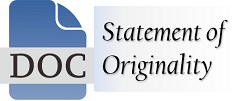Challenges to Global Security: Population Health
DOI:
https://doi.org/10.31599/jki.v20i3.340Abstrak
Abstract
Population health is one of the some challenging in global security. This trend poses new challenges and opportunities for global public health, which is centrally concerned with identifying and addressing threats to the health of vulnerable populations worldwide. Rapid population growth has to be controlled by amount and equalization by demographic. Demographic policy no doubt lies within the national jurisdiction of sovereign states. The resolution of demographic policy has to be resolved between countries. All the countries have a role to play in setting goals, and with the cooperation with WHO and WTO. Multilateral cooperation are needed to create global security to promote health for its population globally.
Keywords: Population, Health, Cooperation, Multilateral
Abstrak
Kesehatan penduduk adalah salah satu dari berbagai tantangan dalam keamanan global. Tren tersebut menghadirikan tantangan dan peluang baru bagi kesehatan masyarakat global, yang secara menyeluruh berkaitan dengan identifikasi dan penanganan ancaman terhadap kesehatan populasi yang rentan di seluruh dunia. Pertumbuhan penduduk yang cepat harus dikendalikan oleh jumlah dan pemerataan demografis. Kebijakan demografis tidak diragukan lagi terletak pada yurisdiksi nasional masing – masing negara. Resolusi kebijakan demografis harus diselesaikan antar negara. Semua negara memiliki peran untuk dilakukan dalam menetapkan tujua dengan bekerja sama dengan WHO dan WTO. Kerja sama multilateral diperlukan untuk menciptakan keamanan global guna meningkatkan kesehatan penduduksecara global.
Kata kunci: Populasi, Kesehatan, Kerja Sama, Multilateral
Unduhan
Referensi
Bashford, Alison (2008). Population, Geopolitics, and International Organization in the Mid Twentieth Century. Journal of World History. Vol. 19 No. 3, New Histories of United Nations (Sep.2008); pp. 327 – 347
Cannon G. (2009). Out of the box. Public Health Nutr; 12:732–4. https://doi. org/10.1017/S1368980009005370.
Deaton, Angus (2004). Health in an age of globalization. Princeton University
Dodgson R, Lee K, Drager N. (2002). Global health governance: a conceptual review. Centre on Global Change and Health, London School of Hygiene and Tropical Medicine, London.
Fidler, David P, (2001). The globalization of public health: the first 100 years of international health diplomacy. Bulletin of the World Health Organization, WHO.
Held D, McGrew AG, Goldblatt D, Perraton J (1999). Global transformations: politics, economics and culture. Stanford. Stanford University Press; 1999
Inozemtsev, N.N. (1981) Global Problems of Our Age. Progress Publisher, Moscow
Kickbusch I, Quick J. (1998). Partnerships for health in the 21st century. World Health Stat Q;51:68–74 http://www.ncbi.nlm.nih.gov/pubmed/9675811.
Mello MM, Pomeranz J, Moran P. (2008). The interplay of public health law and industry self-regulation: the case of sugar-sweetened beverage sales in schools. Am J Public Health. 2008;98:595–604. https://doi.org/10.2105/AJPH. 2006.107680.
Newcomb J (2003). Biology and borders: SARS and the new economics of bio-security. Bio Economic Research Associates, Cambridge – UK.
Reddy SG (2020). Coronavirus and the limits of economics. Available: https://foreignpolicy.com/2020/03/31/coronavirus-pandemicrethinking-economics/
Wilson, Thomas R (2001). Global Threats and Challenges Through 2015. United States of America
Yin, R. K. (2003). Case study research: Design and methods (3rd ed.). Thousand Oaks, CA: Sage.












_-_Copy1.jpg)




